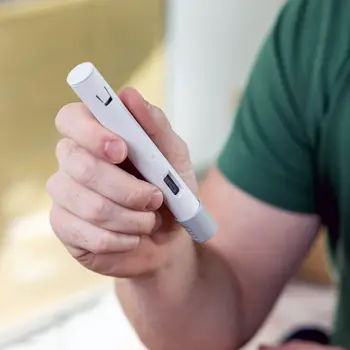Does Birth Control Make You Gain Weight?
A common worry for women thinking about starting birth control is whether it will make them gain weight. While most studies haven't found a direct link between birth control and weight gain, some evidence suggests that certain types of birth control may temporarily cause weight gain due to factors like water retention and an increased appetite.
Here’s an overview of managing weight while you’re on birth control.
Ready to achieve your weight loss goals?
Shed pounds with GLP-1 medication prescribed online by licensed healthcare providers for as low as $75/month.


How Does Birth Control Work?
Birth control is a form of contraception that involves using medications, devices, or surgery to prevent pregnancy. These methods work in different ways to ensure sperm doesn’t meet an egg or to stop an egg from sticking to the uterus. Birth control options may include more permanent solutions like sterilization, barrier methods (like condoms and diaphragms), or hormonal methods (such as pills, patches, injections, and hormonal IUDs).
Female sterilization (tubal ligation) involves blocking, sealing, or cutting the fallopian tubes — which prevents eggs from traveling from the ovaries to the uterus, thus preventing fertilization.
Barrier methods of birth control work by creating a block between the sperm and the egg and ensuring they don’t meet.
Hormonal methods release estrogen and progestin into the blood system. These hormonal fluctuations may cause a similar effect you experience the week before your period. They prevent ovulation by thickening cervical mucus and thinning the uterine lining. Here are types of hormonal birth control.
Hormonal birth control | How it works |
Oral contraceptives | Oral contraceptives are taken by mouth to prevent pregnancy. While combination pills contain both estrogen and progestin, mini pills only contain progestin. They are taken daily. |
Birth control patch | The birth control patch is a small adhesive patch worn on the skin that helps release a combination of estrogen and progestin into the bloodstream. The patch is replaced weekly for three weeks, followed by a week without a patch to allow for a menstrual period. |
Birth control injection (Depo-Provera) | Birth control injections deliver a shot of progestin. They are administered every three months. |
Birth control implant (Nexplanon) | A birth control implant is a small, flexible rod implanted under the skin of the upper arm that releases progestin. It provides protection against pregnancy for up to three years. |
Hormonal IUD (Intrauterine Device) | An IUD is a T-shaped device inserted into the uterus that releases progestin. Brand name options include Mirena, Skyla, and Liletta. |
Vaginal ring (NuvaRing or Annovera): | Vaginal rings are flexible rings inserted into the vagina that release a combination of estrogen and progestin. They are typically worn for three weeks and removed for one week to allow for a menstrual period. They can then be replaced with a new ring. |
Does Birth Control Cause Weight Gain?
It’s known that some women who stop taking hormonal birth control often do so because they think it’s been causing them to gain weight. However, the relationship between birth control and weight gain is a topic of ongoing research and debate.
Here is an overview of how different birth control methods may be related to weight gain.
Depo-Provera (birth control injection): Birth control injection contains high levels of progestin (which may cause increased appetite). Some studies showed that it’s associated with an average weight gain of three pounds in one year and about 14 pounds over 10 years. A 2020 study also showed that Depo-Provera may lead to increased body fat.
Progestin-only pills (mini-pills): Some women on progestin-only pills may experience weight gain, although this is less common and typically less significant than with Depo-Provera. The weight gain is thought to be due to fluid retention or changes in appetite.
Combination pills: One study in 2020 found that combined oral pills (which contain both estrogen and progestin) may cause an increase in body fat along with a decrease in body mass. However, some other studies on combined pills reported both weight gain and weight loss. Some people may experience increased body fat, while some others experience weight loss — or no change in weight.
IUDs: Some studies showed that IUDS may be linked to an average weight gain of 0.7 pounds in the first year and about four pounds over 10 years. However, the evidence is not strong. Any weight gain that is usually minimal and could be related to fluid retention or hormonal changes.
Factors Influencing Weight While on Birth Control
Studies show that weight gain directly caused by birth control is uncommon and not strongly supported by evidence. However, some women might still notice weight changes, and there are a few possible contributing factors.
Impact of estrogen and progestin in some individuals
Hormonal birth control works by releasing estrogen and progestin.
Estrogen may lead to water retention, resulting in bloating or temporary weight gain.
Progestin may cause increased appetite and trigger emotional eating. It may also make you more likely to crave sweets or high-calorie foods. Especially progestin-only birth control shots have been shown to cause that.
In some individuals, the symptoms caused by estrogen and progestin may be more pronounced, leading to increased appetite and more significant bloating.
Other health conditions
People with hormonal disorders may have higher fat and cholesterol levels compared to others. A study on women with polycystic ovary syndrome (PCOS) has found that people with this condition have a greater increase in fat than others when taking the combined pill (that contains both progestin and estrogen).
Genetics
Genetic differences may affect how individuals metabolize hormones and respond to hormone-based treatments. However, it’s not possible to predict how your body will react to hormonal contraception before trying it first.
Age
Many people start taking birth control during adolescence. Some weight gain is during these years. It’s also typical to gain around one to two pounds per year as you get older. If this coincides with the time when many people start using birth control, it makes it tricky to figure out the cause of your weight gain.
Get prescription weight loss medication online.
Find out if you're eligible for GLP-1s, and get started on your weight loss journey for as low as $75/month.


Managing Weight While on Birth Control
Manage cravings
If you're experiencing increased appetite from hormonal birth control, you can keep your diet well-balanced and nutritious. Incorporate healthy snacks (like fruits, nuts, and yogurt) to satisfy hunger without impacting your weight goals. Staying hydrated and eating regular meals can help mitigate cravings and may prevent weight gain related to hormonal changes. Also, finding healthy ways to cope with stress (such as exercise or mindfulness practices) can help reduce emotional eating, which may be triggered by hormonal fluctuations.
Maintain a balanced diet and exercise routine
Focus on a diet rich in fruits, vegetables, lean proteins, and whole grains to manage potential weight gain from hormonal birth control. You can pair this with regular types of physical activity you enjoy — such as walking, cycling, or swimming. Regular exercise can also help manage weight by balancing out any increase in appetite or changes in metabolism caused by hormonal contraceptives.
Monitor your weight
If you suspect hormonal birth control might be affecting you, track your weight and observe any changes regularly. Adjust your diet and exercise routine as needed to address any weight gain. Monitoring allows you to make timely modifications to stay on track with your health goals.
Consult with your healthcare provider
If you have concerns about weight gain or other side effects from birth control, discuss them with your healthcare provider. They can help you explore alternative contraceptive options or adjust your current regimen to better suit your needs. Your provider can offer guidance on managing any side effects and ensure you find the most effective and comfortable birth control method for you.
Key Point: Birth Control Alternatives
If you’re concerned about weight gain with hormonal birth control, you can consider non-hormonal alternatives. Copper IUDs, condoms, and diaphragms are effective methods that do not involve hormones and therefore do not affect weight. Discuss your options with a healthcare provider to find the method that best fits your needs and lifestyle.
How LifeMD Can Help
It’s possible to manage your weight gain while you’re on birth control, but it can be challenging if you are struggling with chronic weight gain.
While chronic weight gain can be frustrating, there are ways you can still achieve your weight loss goals. The LifeMD’s Weight Management Program provides eligible patients with access to licensed medical professionals who can help you kickstart your weight loss journey with GLP-1 medications and ongoing care.











